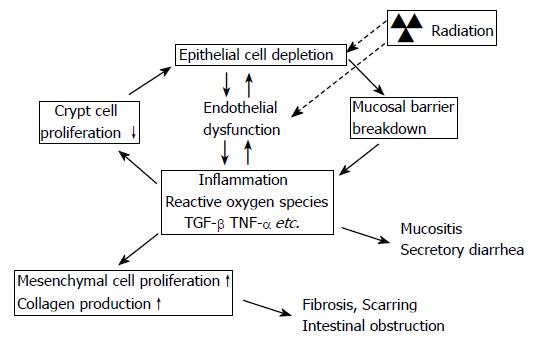Copyright
©2007 Baishideng Publishing Group Co.
World J Gastroenterol. Jun 14, 2007; 13(22): 3047-3055
Published online Jun 14, 2007. doi: 10.3748/wjg.v13.i22.3047
Published online Jun 14, 2007. doi: 10.3748/wjg.v13.i22.3047
Figure 1 Model of interaction between epithelial and endothelial radiation injury in the intestine demonstrating how endothelial dysfunction may exacerbate the early intestinal radiation response and “drive” the cycle of chronicity of intestinal radiation fibrosis.
Radiation causes epithelial crypt cell death, leading to insufficient replacement of the villus epithelium, and breakdown of the epithelial barrier that normally separates intestinal tissue from the intraluminal contents of the intestine. Simultaneously, radiation causes endothelial dysfunction, notably loss of thromboresistance and increased expression of chemokines and adhesion molecules. The combination of loss of epithelial barrier function and endothelial dysfunction enhances the post-radiation inflammatory response, inhibits restitution of the epithelium, and promotes extracellular matrix deposition.
- Citation: Wang J, Boerma M, Fu Q, Hauer-Jensen M. Significance of endothelial dysfunction in the pathogenesis of early and delayed radiation enteropathy. World J Gastroenterol 2007; 13(22): 3047-3055
- URL: https://www.wjgnet.com/1007-9327/full/v13/i22/3047.htm
- DOI: https://dx.doi.org/10.3748/wjg.v13.i22.3047









